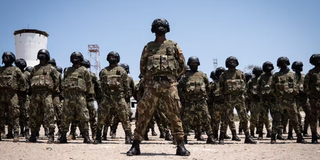Top Mozambican militants killed in operation: Army

Mozambican Armed Defence Forces being inspected in Cabo Delgado Province. Maputo on Friday said it had killed Bonomade Machude Omar, associated with the local al-Shabaab.
Mozambican security forces have declared the death of two of the country’s most sought-after militants in the northern province of Cabo Delgado.
And according to the authorities, the feared al-Shabaab terror group that had operated in the area since 2017, but has no relations to the Somali militants by the same name, have had some of their feathers clipped.
Maputo on Friday said it had killed Bonomade Machude Omar, associated with the local cell of the Islamic State, in the forests of Cabo Delgado.
It had earlier announced killing Abu Kital, a member of the insurgency who acted as the deputy leader of al-Shabaab, also known as Al Sunna wa Jammat.
The development came following the deployment of a joint force to ambush militants in an operation the security agencies said was successful.
The joint force is made up of personnel from the Armed Forces of Defence of Mozambique (FADM), the Southern African Development Community (SADC) and that from the Rwandan defence forces.
Bonomade Machude Omar, aka Abu Suraka, had been directing insurgency operations since the outbreak of terrorism in Mozambique in October 2017.
According to the Armed Forces of Defence of Mozambique (FADM) the death of Mr Omar happened during the operation "Golpe Duro 2" "Hard Knock 2" this week.
Mr Joaquim Mangrasse, FADM Chief of Staff, who made the announcement in Pemba, the capital city of Cabo Delgado province added that "the main terrorist leader has been put out of action during clashes.”
"From the enquiry, which is still ongoing, factual evidence has shown that the main leader directing the operations, Mozambican Bonomade Machude Omar, has been put out of action."
"The images are available, they deserve a definitive assessment, because alongside the terrorist leader, two more of his direct followers, still to be identified, were mortally wounded, in the company of more terrorists," he added.
Cabo Delgado hasn’t known peace since October 2017 when about 30 armed men launched a dawn raid on three police stations in Mocimboa da Praia. The violence has since killed at least 4,000 people and displaced more than 800,000 others.
FADM confirmed the death of the terror cell leader, two days after two other key members of the insurgent, including the deputy commander of the terrorists' operations in Cabo Delgado were killed. A man identified as Ali Mahando, who held important leadership position within the the group, was also killed, a statement said.
On Tuesday, the joint force composed of Mozambican troops, SADC Mission in Mozambique and Rwandan forces were ambushed by the insurgents in an operation.
According to Human Rights Watch (HRW) while the regional troops have been credited with helping to secure towns, allowing safer passage of humanitarian aid and the return of thousands of displaced people to their villages, they have also been implicated in abuses, notably the mistreatment of the dead.
The killing of the terrorist group top figures may signal certainty for stability. But it doesn’t mean the group will be decimated yet.
Although President Filipe Nyusi assured last month that the terrorists had been evicted from Cabo Delgado region, he admitted the group may have gone underground, not finished.
The 43rd Ordinary Summit of the SADC Heads of State and Government, earlier this month, backed the extension of its Mission in Mozambique by twelve months.
But rights lobbies want more transparency in how the Mission will address human rights violations.
“Civilians in the region have suffered horrendous human rights abuses at the hands of the Islamic State-linked armed group Al-Shabaab and the Mozambican forces fighting them,” Human Rights Watch said earlier this month.
In January, a video appeared on social media showing South African soldiers throwing a corpse over a pile of burning rubble apparently containing other bodies.
International humanitarian law prohibits the mutilation and other mistreatment of the dead. SADC leaders were quick to condemn the acts in the video and announced an investigation.
“But eight months later, the regional organization has yet to publish their findings,” HRW said.





